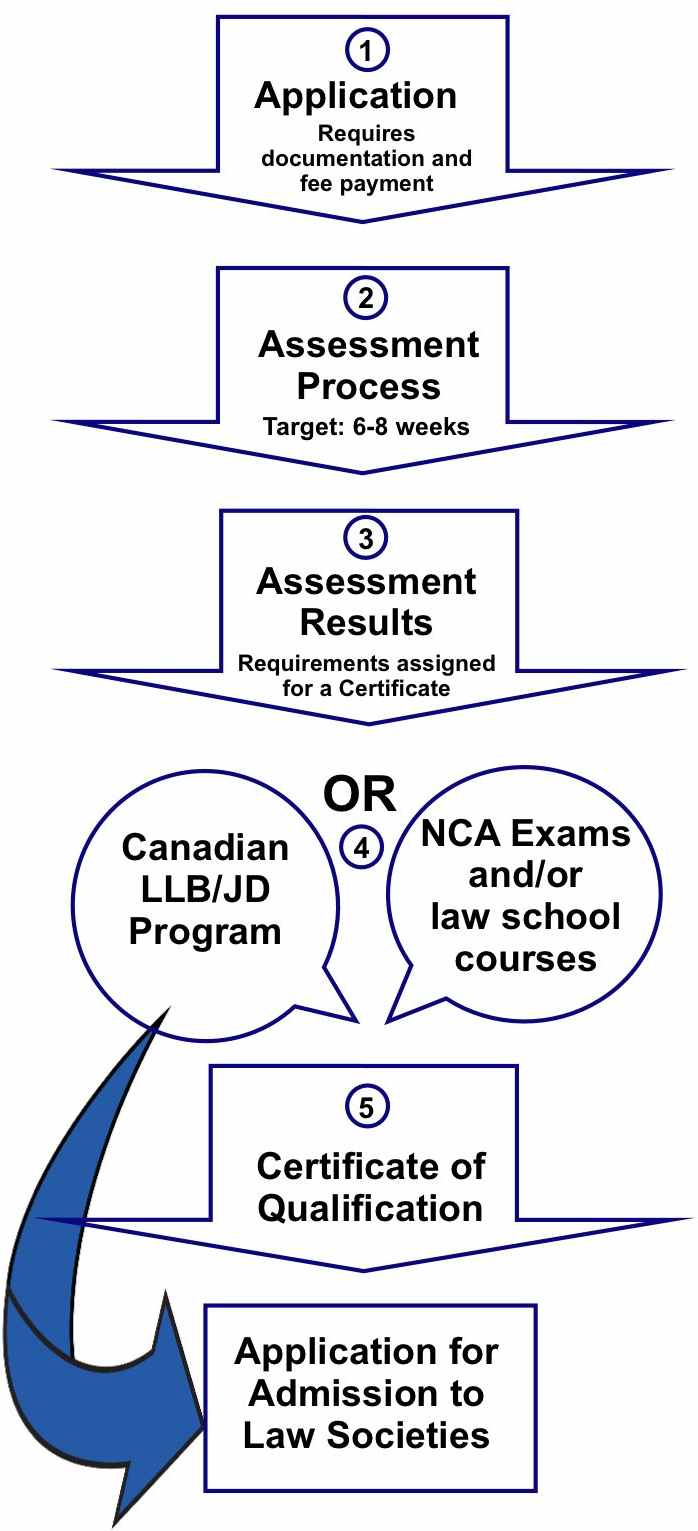

September 30, 2021
Navigating the process to practise law in Canada can be overwhelming for newly migrated legal professionals or lawyers trained internationally. We’ve tried to break this down and help simplify what can be a complex process. Read on for a step-by-step overview and feel free to bookmark this for when you need a refresher. The starting point: gaining accreditation with the NCA.
What is the NCA?
The National Committee on Accreditation (NCA) is responsible for assessing the legal credentials of individuals who have obtained their law degree outside of Canada.
Internationally trained lawyers, Canadian citizens who have completed legal training in another country and Canadian civil law graduates are required to complete the National Committee on Accreditation (NCA) process to become eligible to practise law in any common-law province or territory in Canada.
What is the NCA accreditation process?
The goal of the NCA process is to get your credentials recognized in Canada and receive a ‘Certificate of Qualification’. There are four steps:
- Application: Submit your assessment application which outlines your credentials and includes a fee. Learn more about the application here.
- Assessment: The NCA will review your application. This can take anywhere between 6- 8 weeks.
- Assignments: You are notified by the NCA of your required next steps. Applicants who receive an assessment will be required to demonstrate subject matter competencies in one of three ways
Option A. completing NCA challenge exams;
Option B. completing assigned subjects at a Canadian law school; or
Option C. a combination of option a. and b. - A Certificate: A Certificate of Qualification is awarded when you successfully complete your assigned requirements.

How do I complete my assigned requirements?
Option A: NCA Challenge Exams
The exams take place in all 12 months of the year, however not all exams are offered in each month. The exams are currently being held Online. The exams are open book, graded pass/fail and are generally three hours in length.
Step 1: Register for your Exams
You need to register and pay for your NCA exams before the registration deadline. Registration opens approximately 4-6 weeks before the registration deadline and is payable by credit card only. You can find out more information about NCA Exam Schedules and deadlines here.
Step 2: Prepare for the Exams
The NCA Exams are self-study exams, meaning it is up to you to develop your own exam study materials and study schedule based on the content and required readings outlined in the NCA Syllabi. For most people, this can be a little daunting – this is where OsgoodePD can help. We’ve developed an Online NCA Exam Prep program to assist internationally trained lawyers planning to sit their NCA exams in the next 12 months.
Osgoode’s Online Exam Prep program has been designed by experienced NCA instructors specifically for the online environment. The courses and materials are suitable for anyone planning to complete one or any of the following six NCA subjects: Foundations of Canadian Law, Canadian Constitutional Law, Canadian Administrative Law, Canadian Criminal Law, Property Law, and Professional Responsibility.
Step 3: Complete the NCA Exams
You will need to meet the technical specifications to qualify for the NCA Online Exams.
The exams are open book and only hard copy study materials are permitted. Make sure to consult the NCA exam rules before you plan to take your exams.
Two weeks before the exam session starts you will be provided information about your exam start time for the exams you registered for.
Your exam results are generally released 10-12 weeks following the last scheduled exam for the session. If you do not pass your NCA exam(s), you will need to register for the same exam in a future sitting. See Option B below.
Step 4: Request Certificate of Qualification
Once you have successfully passed all of your NCA Exams, you have completed your NCA requirements. You can now request your Certificate of Qualification through the NCA portal.

Option B: Taking Canadian Law School Courses
There are a number of instances where the NCA may advise you to proceed with the NCA accreditation process by enrolling in Canadian law school studies:
- internationally trained lawyers from non-common law jurisdictions
- internationally trained lawyers with distance education degrees
- as well as internationally trained lawyers with very little experience with common law.
For internationally trained lawyers from common law jurisdictions, the NCA may have provided you with an assessment that allows you to meet your assigned NCA competencies by enrolling in Canadian law school studies.
Step 1: Get NCA pre-approval & apply to law schools
Once you receive notification of courses/subjects you will need to complete, you can apply to the law school of your choice following their standard application process. You will need to gain the NCA’s pre-approval of any course you plan to take to satisfy an NCA requirement.
If you consider Osgoode’s LLM in Canadian Common Law to demonstrate your competencies, you will need to apply through the standard Application process.
If you decide to complete your assessment through a selection of single courses, you will also need to ensure you adhere to application deadlines when applying for your chosen courses.
Step 2: Complete your courses and send transcripts to the NCA
When you have successfully completed your courses, you will need to arrange for your official transcripts to be sent to the NCA so you can move forward with completing the Accreditation process.
Step 3: Requesting your Certificate of Qualification
Once you have successfully completed your NCA requirements, you can request your Certificate of Qualification through the NCA portal.

What are the next steps after NCA accreditation?
From here, you can take the next steps in obtaining your license to practise law in Canada. The description below will focus on the process in Ontario; if you’re interested in practising in another Canadian province or territory, consult the Law Society rules for that jurisdiction.
Get licensed! The Licensing Process in Ontario is overseen by the Law Society of Ontario. As part of this process, there is a “Good Character” requirement, two licensing exams that you will need to pass (i.e. the Barrister Licensing Examination and the Solicitor Licensing Examination) and an Experiential Training requirement.
Get Regulated! The Good Character Requirement is another part of the licensing process.
Licensing exams! You will be required to submit your NCA Certificate of Qualification before you sit your licensing exams. There are two licensing exams: the Barrister licensing Examination and the Solicitor licensing Examination. Each exam is be based exclusively on materials provided by the Law Society. No additional study materials are needed. Each exam is 4 hours in length and is composed of 150 multiple-choice items.
Experiential Training! In addition to your licensing exams, you will be required to complete experiential training.
Explore articling! If you select articling to satisfy the experiential training component, you are required to work in an articling job for 10 months. Articling recruitment generally takes place in the summer of each year, with positions starting the following summer – so you will need to plan ahead. At OsgoodePD, we offer students of our Canadian Common Law Program support in applying and preparing for articling positions (or alternative career options, for those who don’t plan to get licensed or are on a longer timeline for licensing).
Register for the LPP! The Law Practice Program (LPP) runs only once a year. It is an eight-month program broken into two parts – a four-month legal training course and four months work placement. You will need to complete both parts of the program to satisfy the experiential training component of the Law Society’s Lawyer Licencing Process.
Get Called – to the Bar! You’ve made it to the final step in the Licensing Process. To reach this point, you would have successfully completed all licensing requirements. Getting called to the Bar means you are officially a lawyer and are recognized as both a Barrister and Solicitor in Ontario.
To take part, you will need to make sure your file with the LSO is up-to-date with all relevant documents illustrating your credentials.
Obtaining your accreditation and licence to practice law in Ontario can seem like a long and arduous process, but there are many programs and resources available at OsgoodePD, NCA, and the LSO to help you navigate this transition and adequately prepare you for this journey!
Want to learn more about OsgoodePD’s Online NCA Exam Prep Program? Learn more here:

